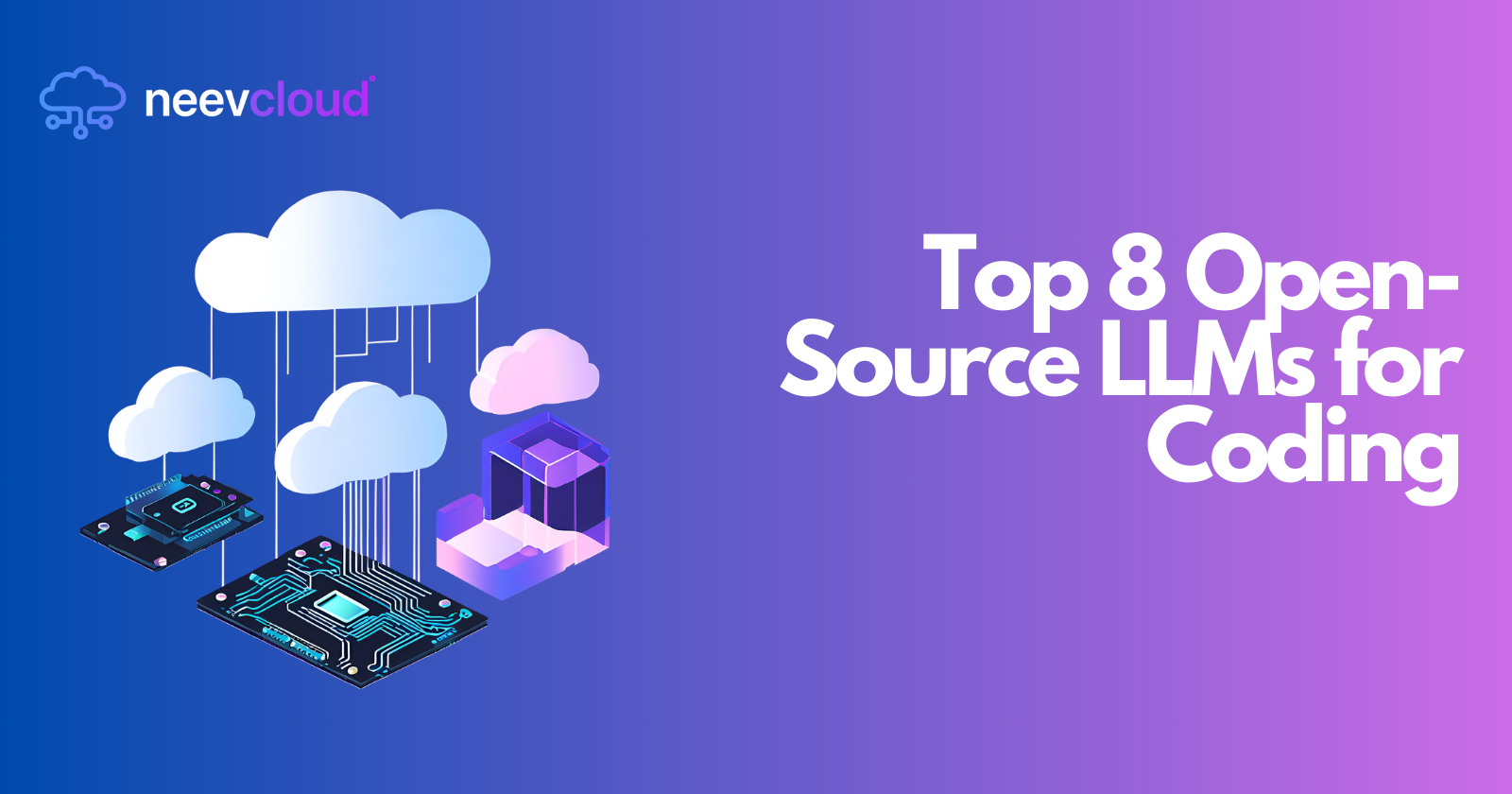Top 8 Open-Source LLMs for Coding
 Tanvi Ausare
Tanvi Ausare
As large language models (LLMs) have revolutionized coding assistance and software development, open-source options are thriving. For developers, data scientists, and tech leaders, the right LLM can enhance productivity and streamline processes in ways once unimagined. The AI Cloud environment allows these models to scale, offering efficient code generation, bug detection, and documentation assistance. Open-source LLMs, hosted in AI datacenters, are essential for customized development and innovation.
Below, we explore the top eight open-source LLMs for coding, each contributing unique features and advantages.
1. GPT-Neo and GPT-J by EleutherAI
EleutherAI’s GPT-Neo and GPT-J models stand as significant alternatives to OpenAI's GPT-3, especially when hosted on scalable AI cloud infrastructure. These models, especially GPT-J, deliver impressive results in code generation, autocompletion, and debugging.
Strengths:
Flexible customization due to open-source access.
Strong results in generating code snippets, comments, and documentation.
Highly suitable for running in AI Datacenters, ensuring low latency and better performance with high workloads.
Ideal Use Cases:
Software projects requiring tailored coding models.
Organizations using private or hybrid cloud setups that need secure, self-hosted solutions.
2. CodeGen by Salesforce Research
Salesforce's CodeGen is a specialized LLM designed specifically for coding, focusing on Python but adaptable to other languages. It’s trained on public GitHub code repositories, making it a natural fit for coding tasks.
Strengths:
Enhanced performance on code-related tasks due to domain-specific training.
Strong adaptability across multiple languages and frameworks.
High scalability when deployed on AI Cloud infrastructures, suitable for parallel workloads.
Ideal Use Cases:
Teams looking to optimize code quality or develop a coding assistant within their AI Cloud.
Scenarios requiring an LLM capable of supporting diverse programming languages.
3. StarCoder by BigCode
BigCode’s StarCoder is gaining traction as a powerful model with a strong focus on code generation. It offers a 15-billion parameter LLM that provides high accuracy in code autocompletion and contextual understanding.
Strengths:
Effective at understanding complex code context, especially in languages like Python, JavaScript, and TypeScript.
Open-source with licensing that allows for customization and deployment on private clouds.
High compatibility with AI Datacenters for secure, scalable coding assistance.
Ideal Use Cases:
Enterprise-level code generation and auditing in secure environments.
AI-powered IDEs or integrated developer tools hosted in private AI Clouds.
4. PolyCoder
PolyCoder is a niche LLM with strong capabilities in C-based languages, such as C++, C#, and Java. Developed as part of research into multi-language coding models, PolyCoder offers unique performance enhancements for specific languages.
Strengths:
Optimized for C-based languages, providing specialized support for low-level programming.
Easily deployable on AI Datacenters with high compatibility across cloud platforms.
Suitable for secure and custom applications due to its open-source nature.
Ideal Use Cases:
Teams working on embedded systems or applications where C/C++ is prominent.
Developers looking to integrate an large language model into their AI Cloud for multi-language support.
5. Incoder by Meta
Incoder, developed by Meta, offers a unique approach to autocompletion and code generation by using masked language modeling, enabling it to perform well in generating code from scratch and filling in function blocks.
Strengths:
Flexible with support for multiple languages, making it versatile in coding environments.
Easily deployable in AI Cloud setups, leveraging datacenter resources for scaling.
Robust performance in autocompletion, especially for intermediate-to-complex code structures.
Ideal Use Cases:
Project teams looking to incorporate AI-driven code suggestion directly into IDEs.
Organizations aiming to deploy Incoder in an AI Datacenter for enhanced performance on large datasets.
6. BLOOM by BigScience
BLOOM, a multilingual LLM, is ideal for global teams working with code in different languages. Its code generation abilities span multiple languages and are especially powerful when coupled with a cloud-based or datacenter infrastructure.
Strengths:
Multilingual support for development teams with diverse language needs.
Open-source, highly customizable, and adaptable for various coding tasks.
Compatible with AI Cloud platforms, where it benefits from flexible scaling.
Ideal Use Cases:
Multinational organizations needing language-agnostic coding support.
AI Datacenters providing large-scale, multi-language coding support for global users.
7. AlphaCode by DeepMind
AlphaCode by DeepMind is a performance-oriented LLM trained for competitive coding scenarios, designed to tackle complex problem-solving tasks often seen in programming competitions.
Strengths:
Advanced in solving algorithmic problems, excellent for competitive coding.
High customization potential for coding competitions or educational purposes.
Optimized for AI Datacenter deployments, where it can be scaled efficiently to handle multiple users and queries.
Ideal Use Cases:
Coding competitions or learning platforms needing AI-driven problem solvers.
Cloud-based coding platforms requiring sophisticated logic and problem-solving capabilities.
8. Codex by OpenAI (Open-Source Variant)
Codex is the foundational model for GitHub’s Copilot and provides a robust open-source version for coding. Although its proprietary variant is popular, open-source alternatives based on Codex are accessible, enabling organizations to benefit from its code understanding and generation features.
Strengths:
High compatibility with existing code repositories.
Strong support for code commenting, bug detection, and documentation.
Benefits from AI Cloud infrastructure where multiple instances can run simultaneously, optimizing code suggestions for large development teams.
Ideal Use Cases:
Enterprise solutions looking for GitHub-like coding assistants but with on-premise or private cloud hosting.
Custom code documentation tools where Codex’s understanding of code context and structure can be leveraged.
Key Takeaways for Deploying Open-Source LLMs in Coding
Open-source LLMs are transforming coding and software development. While some are domain-specific, others, like GPT-Neo and BLOOM, offer versatility and scalability that can support broader applications in AI Cloud environments. Leveraging AI Datacenters can maximize the performance and efficiency of these models, providing developers with high-performance, private LLM instances that streamline coding workflows.
Deploying open-source LLMs in AI Clouds offers unique advantages:
Cost Savings: Avoiding high licensing fees tied to proprietary models.
Customization: Tailoring models to suit specific coding requirements and organizational needs.
Scalability: Leveraging the AI Datacenter’s ability to handle extensive workloads and multiple user queries.
Privacy and Security: AI Datacenters provide secure environments, critical for sensitive projects.
Conclusion
The rise of open-source LLMs has reshaped the coding landscape, offering unique features tailored to various languages and coding challenges. Whether it’s the multilingual capabilities of BLOOM, the algorithmic prowess of AlphaCode, or the domain-specific utility of CodeGen, the right LLM for coding can significantly impact productivity and streamline development.
The journey to selecting an LLM for coding involves understanding your project needs, the level of customization required, and the desired scalability that an AI Cloud infrastructure can provide. Through AI Datacenters, these models can operate at peak performance, delivering tailored code generation, debugging, and documentation assistance that keep projects moving forward efficiently.
Leveraging the right LLM from this list will enable you to create smarter, more responsive, and highly efficient development environments—making AI Cloud-hosted open-source LLMs indispensable for modern development.
Subscribe to my newsletter
Read articles from Tanvi Ausare directly inside your inbox. Subscribe to the newsletter, and don't miss out.
Written by
